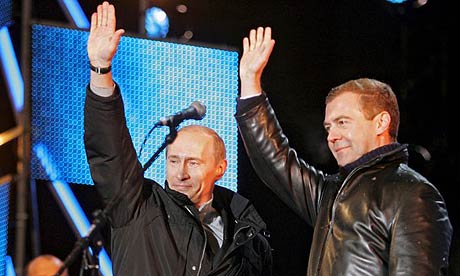Medvedev's mandate doesn't extend to sweeping reform
 Dmitry Medvedev was 25 when the Soviet Union collapsed in 1991. He was only 19 when Mikhail Gorbachev came to power and introduced Glasnost and Perestroika (openness and restructuring), the twin pillars of reform which were to transform Russia. The 42 year old, who will become the President of the Russian Federation in May, will be in many respects the first genuinely post-Soviet leader that Russia has experienced.
Dmitry Medvedev was 25 when the Soviet Union collapsed in 1991. He was only 19 when Mikhail Gorbachev came to power and introduced Glasnost and Perestroika (openness and restructuring), the twin pillars of reform which were to transform Russia. The 42 year old, who will become the President of the Russian Federation in May, will be in many respects the first genuinely post-Soviet leader that Russia has experienced.In the wake of Medvedev’s election victory yesterday, in which he appears to have claimed in the region of two thirds of the vote, speculation has re-emerged as to whether the outgoing President, Vladimir Putin, who will become Medvedev’s Prime Minister, will retain the bulk of political influence in Russia. Although the incoming President has indicated that he will work closely with Putin and continue to follow a similar policy course, at yesterday’s rally in Red Square he reiterated that he would exercise his constitutional right to formulate foreign policy.
Gordon Brown and David Milliband are likely to view the change in leader as a pragmatic opportunity to pursue a thaw in relations between Britain and Russia. The Prime Minister is likely to offer Medvedev congratulations by phone today and with Sir Tony Brenton departing the UK’s Moscow Embassy as something of a symbolic sacrifice, there is enough latitude for both states to focus on common goals and interests rather than the disputes which have marked the last two years.
Nevertheless Medvedev commands the support of a majority of Russians because he has undertaken to maintain the stable course set by Putin and provide continuity politically with the outgoing regime. Whatever independence Medvedev asserts, it is unlikely to involve dramatic changes of policy. In many ways, should the new President set a radically altered course, he would be straying from the mandate which the Russian people have provided him.
Although Russia’s path of sovereign democracy and state-based energy monopolies will remain true, Medvedev is a leader who will not have the ‘siloviki’ baggage of his predecessor. Authoritarianism may remain, but there is every chance that controls on the press may be relaxed and the primacy of the rule of law will be more fastidiously asserted. Beyond this there is no great appetite for extensive reform in Russia and western observers will simply have to accept that the system of government there enjoys the support of a large majority.
Comments
velvet bedsheets online
makhmal ki bedsheet
palm angels outlet
kyrie 7 shoes
golden goose outlet
kyrie 7
nike dunks
supreme
bape hoodie
off white outlet
golden goose black friday